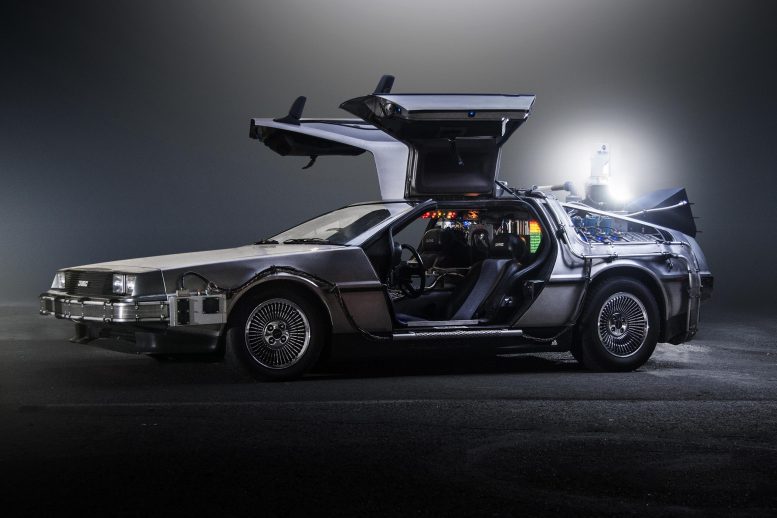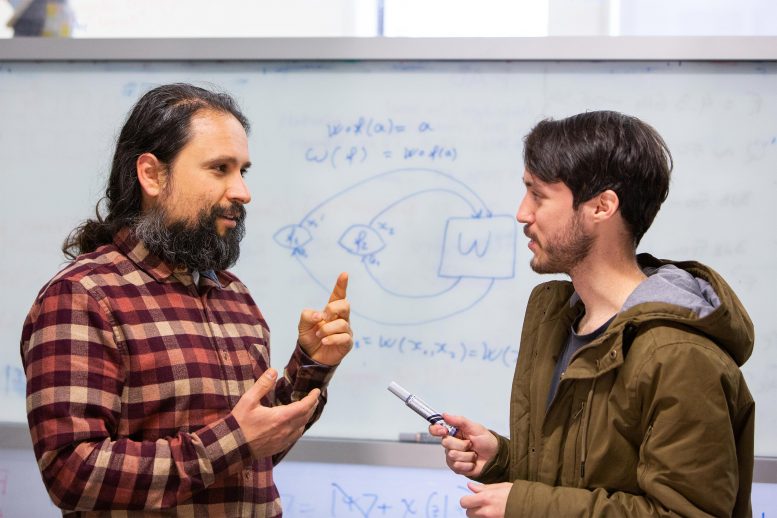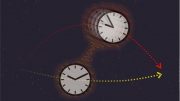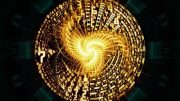
- April 1, 2024 | Archaeological Study Exposes Secrets of Medieval Horse Trading
- April 1, 2024 | Unlocking the Secrets of Thermoelectric Materials for Future Energy
- April 1, 2024 | Cosmic Mysteries Unveiled: The Short, Brilliant Lives of CSOs
- April 1, 2024 | Scientists Reveal 5 Factors To Ensure an Infant Thrives
- April 1, 2024 | Simple Predictions Were Wrong: New Research Shatters Old Climate Change Assumptions

Paradox-Free Time Travel Is Theoretically Possible: Physicist “Squares the Numbers” on Time Travel
By University of Queensland September 24, 2020

UQ physicists have been seeking to understand the time travel’s underlying laws. Credit: JMortonPhoto.com & OtoGodfrey.com
Paradox-free time travel is theoretically possible, according to the mathematical modeling of a prodigious University of Queensland (UQ) undergraduate student.
Fourth-year Bachelor of Advanced Science (Honours) student Germain Tobar has been investigating the possibility of time travel, under the supervision of UQ physicist Dr. Fabio Costa.
“Classical dynamics says if you know the state of a system at a particular time, this can tell us the entire history of the system,” Mr. Tobar said. “This has a wide range of applications, from allowing us to send rockets to other planets and modeling how fluids flow.
“For example, if I know the current position and velocity of an object falling under the force of gravity, I can calculate where it will be at any time.
“However, Einstein’s theory of general relativity predicts the existence of time loops or time travel – where an event can be both in the past and future of itself – theoretically turning the study of dynamics on its head.”
Mr. Tobar said a unified theory that could reconcile both traditional dynamics and Einstein’s Theory of Relativity was the holy grail of physics.
“But the current science says both theories cannot both be true,” he said. “As physicists, we want to understand the Universe’s most basic, underlying laws and for years I’ve been puzzled on how the science of dynamics can square with Einstein’s predictions.”
“I wondered is time travel mathematically possible?”
Mr. Tobar and Dr. Costa say they have found a way to “square the numbers” and Dr. Costa said the calculations could have fascinating consequences for science.

Dr. Fabio Costa (left) with Bachelor of Advanced Science (Honours) student Germain Tobar. Credit: Ho Vu
“The maths checks out – and the results are the stuff of science fiction,” Dr. Costa said.
“Say you traveled in time, in an attempt to stop COVID-19 ’s patient zero from being exposed to the virus . However if you stopped that individual from becoming infected – that would eliminate the motivation for you to go back and stop the pandemic in the first place.
“This is a paradox – an inconsistency that often leads people to think that time travel cannot occur in our universe.
“Some physicists say it is possible, but logically it’s hard to accept because that would affect our freedom to make any arbitrary action. It would mean you can time travel, but you cannot do anything that would cause a paradox to occur.”
However, the researchers say their work shows that neither of these conditions has to be the case, and it is possible for events to adjust themselves to be logically consistent with any action that the time traveler makes.
“In the coronavirus patient zero example, you might try and stop patient zero from becoming infected, but in doing so you would catch the virus and become patient zero, or someone else would,” Mr. Tobar said.
“No matter what you did, the salient events would just recalibrate around you. This would mean that – no matter your actions – the pandemic would occur, giving your younger self the motivation to go back and stop it.
“Try as you might to create a paradox, the events will always adjust themselves, to avoid any inconsistency.
“The range of mathematical processes we discovered show that time travel with free will is logically possible in our universe without any paradox.”
Reference: “Reversible dynamics with closed time-like curves and freedom of choice” by Germain Tobar and Fabio Costa, 21 September 2020, Classical and Quantum Gravity . DOI: 10.1088/1361-6382/aba4bc
More on SciTechDaily

Physicists Put Einstein to the Test With a Quantum-Mechanical Twin Paradox

Quantum Paradox Experiment Puts Einstein to the Test – May Lead to More Accurate Clocks and Sensors

Paradoxes of Probability & Statistical Strangeness

A Force From “Nothing” Used to Control and Manipulate Objects

New Quantum Paradox Reveals Contradiction Between Widely Held Beliefs – “Something’s Gotta Give”

“Obesity Paradox” Debunked in New Research

Peto’s Paradox – Biological Enigma Offers New Insights Into the Mystery of Cancer

Hawking’s Information Paradox: Resolving the Black Hole “Fuzzball or Wormhole” Debate
20 comments on "paradox-free time travel is theoretically possible: physicist “squares the numbers” on time travel".
“Try as you might to create a paradox, the events will ALWAYS adjust themselves, to avoid any inconsistency.”
What if someone were to got back in time and kill their mother before she gave birth to him? How does that get ‘adjusted?’
You decide to go back and end Covid-19; it is Sept 24 2020: If you stopped “person-zero” from getting COVID-19, then “person-one” will get it in the “adjustment”. Back in Sept 24, 2020, COVID-19 is still around, and you still decide to go back to stop it. So then you are stopping “person-one”, and “person-two” gets the adjustment. Back in Sept 24, 2020, COVID-19 is still around, and you still decide to go back to stop it. So then you are stopping “person-two” and “person-three” gets the adjustment. So ….. you get trapped in an infinite time-loop from which you can never escape. OR this is a poorly written article in which (a) the author did not understand the mathematical model, or (b) the mathematicians did a poor job explaining what they are modeling, or (c) both, or (d) the MODEL is an incorrect model of the “real” universe, even though the “math” that describes the model is error free. Whatever the answer, this article left me with more questions than answers regarding the title of the article. WHAT?
I don’t think it’s neccessary to get trapped in endless loop. If I would like to try to stop the Patient-Zero from being infected by jumping back in time I would see the futility of the failed attempts and give up after a few loops. More over, jumping back-and-back-to-the-future-again should not cause memory erasure so all the trials would appear to me as a normal cause-effect chain from my perspective, so why should I try again and again? But now we know that timespace could be this self-correcting data stream and I should take this theory into consideration before I try to lose a chunk of >my< lifespan in the history. But that's just me trying to sound logical to myself 🙂
It seems that the poison made by Einstein continues toxicating physicists who blindly believe the current orthodox. They use general relativity as a tool to mathematically speculate the possibility of the existence of closed time curves in the so-called four-dimensional spacetime, but have never seriously defined what time travel really means. When they say somebody time travels to the past, which is the boundary of the person and his surroundings, and how do his surroundings continuously connect from the present to the past? Obviously, there is no way to have a logically consistent definition for so-called time travel.
It’s true that time scale is different for different physical processes. For example, a rabbit thinks that one year is a long time, but a turtle feels one year is just a blink. Some physical processes can even be reversed. Thus we define our physical time to be irreversible with a fixed scale as shown on a physical clock and use a rate to customize the description of the change of each physical process. For example, when a car has driven 100 km at a speed of 100 km/h, we know it takes one hour time, but then after it has driven for another 100 km backward at the same speed, we still think that the time it takes is another hour rather than a negative one hour because we consider the backward speed is negative, rather than time is negative. If somebody got healthier and looked younger after eating some special food, we would not think that time was reversed but just his aging rate was negative during the period. Reversible physical processes exist everywhere, but our physical time is always irreversible as we have defined.
Einstein made a fatal mistake in his special relativity. He assumed that the speed of light should be the same relative to all inertial reference frames, which requires the change of the definition of space and time. But he never verified that the newly defined time was still the time measured with physical clocks. Then many mathematicians and theoretical physicists think that time is like a playdough which can be made to fit all kinds of theories, while our physical time measured with physical clocks is stiff and absolute, which won’t change with the change of the definition of the space and time. Actually, the newly defined relativistic time is no longer the time measured with physical clocks, but just a mathematical variable without physical meanings, which can be easily verified as follows:
We know physical time T has a relationship with the relativistic time t in Einstein’s special relativity: T = tf/k where f is the relativistic frequency of the clock and k is a calibration constant. Now We would like to use the property of our physical time in Lorentz Transformation to verify that the relativistic time defined by Lorentz Transformation is no longer our physical time.
If you have a clock (clock 1) with you and watch my clock (clock 2) in motion and both clocks are set to be synchronized to show the same physical time T relative to your inertial reference frame, you will see your clock time: T1 = tf1/k1 = T and my clock time: T2 = tf2/k2 = T, where t is the relativistic time of your reference frame, f1 and f2 are the relativistic frequencies of clock 1 and clock 2 respectively, k1 and k2 are calibration constants of the clocks. The two events (Clock1, T1=T, x1=0, y1=0, z1=0, t1=t) and (Clock2, T2=T, x2=vt, y2=0, z2=0, t2=t) are simultaneous measured with both relativistic time t and clock time T in your reference frame. When these two clocks are observed by me in the moving inertial reference frame, according to special relativity, we can use Lorentz Transformation to get the events in my frame (x’, y’, z’, t’): (clock1, T1′, x1’=-vt1′, y1’=0, z1’=0, t1′) and (clock2, T2′, x2’=0, y2’=0, z2’=0, t2′), where T1′ = t1’f1’/k1 = (t/γ)(γf1)/k1 = tf1/k1 = T1 = T and T2′ = t2’f2’/k2 = (γt)(f2/γ)/k2 = tf2/k2 = T2 = T, where γ = 1/sqrt(1-v^2/c^2). That is, no matter observed from which inertial reference frame, the events are still simultaneous measured with physical time T i.e. the two clocks are always synchronized measured with physical time T, but not synchronized measured with relativistic time t’. Therefore, our physical time and the relativistic time behave differently in Lorentz Transformation and thus they are not the same thing. The change of the reference frame only makes changes of the relativistic time from t to t’ and the relativistic frequency from f to f’, which cancel each other in the formula: T = tf/k to make the physical time T unchanged i.e. our physical time is still absolute in special relativity. Therefore, based on the artificial relativistic time, special relativity is wrong, so is general relativity. For more details, please check: https://www.researchgate.net/publication/297527784_Challenge_to_the_Special_Theory_of_Relativity
Once we know our physical time is absolute, there is no room for those mathematicians and theoretical physicists to speculate.
I find it disconcerting that space is never discussed while musing over time travel. The arrow of time moves with space, forward. To travel back in time, one would also need to move in space. So, you may go back in time (if you had a sci-fi apparatus), but, the rest of the universe would proceed on its merry way. Thus, you and your apparatus, going back in time one hour would find that you are out drifting in space because the earth and the rest of the universe continues on it way. Time and space do not readily part ways to accommodate a fantasy. There are probably more profitable areas of conjecture for intelligent students, professors and scientists to spend their time.
And because time travel implicitly requires space travel, the amount of energy required becomes mind boggling. Also, because there is a finite limit on the speed of any material object, it means that one can’t go back in time instantaneously. It would require a very long time to move to the position in space occupied by Earth 100 million years ago, even at the speed of light. And, the calculations would have to be unobtainably accurate or one might end up outside the atmosphere, or in the interior of the Earth.
Perhaps we should be changing the name of the website from “Sci-Tech Daily” to “Sci-Assume Daily”?
You fail no matter what you do. It could turn out that it wasn’t really your mother but a lookalike. Or that you hallucinated it, which wouldn’t be far fetched for someone seriously trying to kill their mother.
So this is still wrong. The events wouldn’t “shift” to prevent the paradox. There IS no paradox. You did it because in your timeline the events happened. But in doing so, youve created a timeline where they didn’t. There is no need for your younger self to go back, but you did. This isn’t a paradox, it’s a different timeline. You crated a branch in the timeline. An alternate universe.
What evidence do you have that alternate universes exist?
… Yeah, “Paradox-Free Time Travel Is Theoretically Possible” … it doesn’t mean that we actually have a time travel, or that some advanced civilization has developed a time travel, after all… So! The next idea it might be that aliens are the humans from the future! Yeah, that is a great idea, a really great one…
The act of time traveling is a paradox within itself. It has to happen in the greater time line for everything afterwards to occur. Also, the Russians already achieved a six minute time travel a decade ago…
… “I wondered: “is time travel mathematically possible?”
Well, we all have asked our self the very same question. However, we have no evidence of such a thing happening, or ever happened. Though, it would be great. Second thing is that time dilatation, which has been proven correct, but was it perceived in a proper way, or it is just the numbers that mean something else. …
According to current physical theory, is it possible for a human being to travel through time?
… ask Goedel, he would know about paradoxes that might arise from theory of relativity…
It would correct itself if you tried to kill your mother by someone stopping you from doing it or you leave thinking your mother is dead but isn’t or even that you’re giving birth to buy a different woman. And this time travel thing kind of plays along in the theory that our universe is actually the interior of a black hole just inside the horizon. A wormhole would be like getting right to the edge of the horizon and then it bending you back around to a point in the past as you try to cross it. Which kind of goes along with the fact that if you tried to travel in a straight line away from the Earth fast enough for long enough you would get back to the Earth except if the speed is fast enough you would get back to the Earth in the future though you would not have aged. But anyway going back in the past and killing your mother would be made impossible by whatever happened to stop you from killing her. Moreover you would never even be allowed to meet her at least not where she’s aware that it’s you because that would change the future. So impossible to kill your mother in the past no matter how hard you tried. And people like to say well if sometime people invent time travel to the past why haven’t they come back and talk to us. Maybe it’s impossible because of time correcting itself. Or if creating a paradox is possible people of the future realize that they could wipe themselves out and interference with the past is not something they do. They only observe. Maybe even have rules for exactly when they’re allowed to go to. Maybe they’re only allowed to travel to prehistory. Not travel to somewhere where it could cause a paradox just by knowing someone’s from the future.
All of these comments are interesting and informative.
But they all assume a past Paradigm that only Time Moves. We are holding onto a rock in the river of Time as the current flows past us from the Past through the Present and into the Future.
We are not holding onto the rock of Earth as the Sun, planets, stars and galaxies flow around us. We move through moving Space.
ALL OF THESE VIEWS also assume we can change Time with our actions. WE NEVER CHANGE TIME WITH OUR ACTIONS. WE CHANGE OUR JOURNEY THROUGH TIME WITH OUR ACTIONS. (Drop your egocentric notions.)
We move through moving spacetime.
A Paradigm Shift from geocentric to heliocentric helped explain our neighboring space.
A Paradigm Shift from Newton to Einstein helped explain our neighboring spacetime.
Publishing my spacetime / mattergy Paradigm Shift Work will solve all your Paradoxes.
Time travel could very well be possible in this day and age. But it may be a whole lot slower than people would imagine.
https://www.youtube.com/watch?v=qCEwPT80cSA
I’ve been travelling forward in time for sixty years.
Time travel? The paradox that these two words conjure in one’s analytical mind are endless. No two people imagine what these words mean in the same way. Some believe only a single body jumps through time with all the cognitive capabilities and memories of another time left in tact. Where others imagine the time travelers mind and memories also change to synchronize with the time visited. Does this insinuation limit time travel for someone to the number of years they have been alive? And does the visitation of a time where the traveler was an infant subject that person to a life of Deja-Vu episodes? Does the number of times one has time traveled have a direct correlation with an elevated intelligence to reasoning capability? If so, would that be a reason to assume an increased intellectual capability of anyone who leaps through time to visit our planet. And No, the mere virtue of them having the technology to travel in that method does not imply they must understand how it works. Look how many use modern conveniences regularly with no clue as to their engineering. Everything a person does in this modern society is by the grace of someone else’s knowledge and occupation. My guess is that if time travel is possible, the ancillary effects of doing so would be unavoidable. Nothing in this universe has only positive result. For every action does have an equal and opposite reaction. My luck I would leap to a time in the future, and find its one day after my burial. Oh Chit!
Leave a comment Cancel reply
Email address is optional. If provided, your email will not be published or shared.
Save my name, email, and website in this browser for the next time I comment.
- Skip to main content
- Keyboard shortcuts for audio player

- LISTEN & FOLLOW
- Apple Podcasts
- Google Podcasts
- Amazon Music
- Amazon Alexa
Your support helps make our show possible and unlocks access to our sponsor-free feed.

Paradox-Free Time Travel Is Theoretically Possible, Researchers Say

Matthew S. Schwartz

A dog dressed as Marty McFly from Back to the Future attends the Tompkins Square Halloween Dog Parade in 2015. New research says time travel might be possible without the problems McFly encountered. Timothy A. Clary/AFP via Getty Images hide caption
A dog dressed as Marty McFly from Back to the Future attends the Tompkins Square Halloween Dog Parade in 2015. New research says time travel might be possible without the problems McFly encountered.
"The past is obdurate," Stephen King wrote in his book about a man who goes back in time to prevent the Kennedy assassination. "It doesn't want to be changed."
Turns out, King might have been on to something.
Countless science fiction tales have explored the paradox of what would happen if you went back in time and did something in the past that endangered the future. Perhaps one of the most famous pop culture examples is in Back to the Future , when Marty McFly goes back in time and accidentally stops his parents from meeting, putting his own existence in jeopardy.
But maybe McFly wasn't in much danger after all. According a new paper from researchers at the University of Queensland, even if time travel were possible, the paradox couldn't actually exist.
Researchers ran the numbers and determined that even if you made a change in the past, the timeline would essentially self-correct, ensuring that whatever happened to send you back in time would still happen.
"Say you traveled in time in an attempt to stop COVID-19's patient zero from being exposed to the virus," University of Queensland scientist Fabio Costa told the university's news service .
"However, if you stopped that individual from becoming infected, that would eliminate the motivation for you to go back and stop the pandemic in the first place," said Costa, who co-authored the paper with honors undergraduate student Germain Tobar.
"This is a paradox — an inconsistency that often leads people to think that time travel cannot occur in our universe."
A variation is known as the "grandfather paradox" — in which a time traveler kills their own grandfather, in the process preventing the time traveler's birth.
The logical paradox has given researchers a headache, in part because according to Einstein's theory of general relativity, "closed timelike curves" are possible, theoretically allowing an observer to travel back in time and interact with their past self — potentially endangering their own existence.
But these researchers say that such a paradox wouldn't necessarily exist, because events would adjust themselves.
Take the coronavirus patient zero example. "You might try and stop patient zero from becoming infected, but in doing so, you would catch the virus and become patient zero, or someone else would," Tobar told the university's news service.
In other words, a time traveler could make changes, but the original outcome would still find a way to happen — maybe not the same way it happened in the first timeline but close enough so that the time traveler would still exist and would still be motivated to go back in time.
"No matter what you did, the salient events would just recalibrate around you," Tobar said.
The paper, "Reversible dynamics with closed time-like curves and freedom of choice," was published last week in the peer-reviewed journal Classical and Quantum Gravity . The findings seem consistent with another time travel study published this summer in the peer-reviewed journal Physical Review Letters. That study found that changes made in the past won't drastically alter the future.
Bestselling science fiction author Blake Crouch, who has written extensively about time travel, said the new study seems to support what certain time travel tropes have posited all along.
"The universe is deterministic and attempts to alter Past Event X are destined to be the forces which bring Past Event X into being," Crouch told NPR via email. "So the future can affect the past. Or maybe time is just an illusion. But I guess it's cool that the math checks out."
- grandfather paradox
- time travel

Can we time travel? A theoretical physicist provides some answers
Emeritus professor, Physics, Carleton University
Disclosure statement
Peter Watson received funding from NSERC. He is affiliated with Carleton University and a member of the Canadian Association of Physicists.
Carleton University provides funding as a member of The Conversation CA.
Carleton University provides funding as a member of The Conversation CA-FR.
View all partners
- Bahasa Indonesia
Time travel makes regular appearances in popular culture, with innumerable time travel storylines in movies, television and literature. But it is a surprisingly old idea: one can argue that the Greek tragedy Oedipus Rex , written by Sophocles over 2,500 years ago, is the first time travel story .
But is time travel in fact possible? Given the popularity of the concept, this is a legitimate question. As a theoretical physicist, I find that there are several possible answers to this question, not all of which are contradictory.
The simplest answer is that time travel cannot be possible because if it was, we would already be doing it. One can argue that it is forbidden by the laws of physics, like the second law of thermodynamics or relativity . There are also technical challenges: it might be possible but would involve vast amounts of energy.
There is also the matter of time-travel paradoxes; we can — hypothetically — resolve these if free will is an illusion, if many worlds exist or if the past can only be witnessed but not experienced. Perhaps time travel is impossible simply because time must flow in a linear manner and we have no control over it, or perhaps time is an illusion and time travel is irrelevant.

Laws of physics
Since Albert Einstein’s theory of relativity — which describes the nature of time, space and gravity — is our most profound theory of time, we would like to think that time travel is forbidden by relativity. Unfortunately, one of his colleagues from the Institute for Advanced Study, Kurt Gödel, invented a universe in which time travel was not just possible, but the past and future were inextricably tangled.
We can actually design time machines , but most of these (in principle) successful proposals require negative energy , or negative mass, which does not seem to exist in our universe. If you drop a tennis ball of negative mass, it will fall upwards. This argument is rather unsatisfactory, since it explains why we cannot time travel in practice only by involving another idea — that of negative energy or mass — that we do not really understand.
Mathematical physicist Frank Tipler conceptualized a time machine that does not involve negative mass, but requires more energy than exists in the universe .
Time travel also violates the second law of thermodynamics , which states that entropy or randomness must always increase. Time can only move in one direction — in other words, you cannot unscramble an egg. More specifically, by travelling into the past we are going from now (a high entropy state) into the past, which must have lower entropy.
This argument originated with the English cosmologist Arthur Eddington , and is at best incomplete. Perhaps it stops you travelling into the past, but it says nothing about time travel into the future. In practice, it is just as hard for me to travel to next Thursday as it is to travel to last Thursday.
Resolving paradoxes
There is no doubt that if we could time travel freely, we run into the paradoxes. The best known is the “ grandfather paradox ”: one could hypothetically use a time machine to travel to the past and murder their grandfather before their father’s conception, thereby eliminating the possibility of their own birth. Logically, you cannot both exist and not exist.
Read more: Time travel could be possible, but only with parallel timelines
Kurt Vonnegut’s anti-war novel Slaughterhouse-Five , published in 1969, describes how to evade the grandfather paradox. If free will simply does not exist, it is not possible to kill one’s grandfather in the past, since he was not killed in the past. The novel’s protagonist, Billy Pilgrim, can only travel to other points on his world line (the timeline he exists in), but not to any other point in space-time, so he could not even contemplate killing his grandfather.
The universe in Slaughterhouse-Five is consistent with everything we know. The second law of thermodynamics works perfectly well within it and there is no conflict with relativity. But it is inconsistent with some things we believe in, like free will — you can observe the past, like watching a movie, but you cannot interfere with the actions of people in it.
Could we allow for actual modifications of the past, so that we could go back and murder our grandfather — or Hitler ? There are several multiverse theories that suppose that there are many timelines for different universes. This is also an old idea: in Charles Dickens’ A Christmas Carol , Ebeneezer Scrooge experiences two alternative timelines, one of which leads to a shameful death and the other to happiness.
Time is a river
Roman emperor Marcus Aurelius wrote that:
“ Time is like a river made up of the events which happen , and a violent stream; for as soon as a thing has been seen, it is carried away, and another comes in its place, and this will be carried away too.”
We can imagine that time does flow past every point in the universe, like a river around a rock. But it is difficult to make the idea precise. A flow is a rate of change — the flow of a river is the amount of water that passes a specific length in a given time. Hence if time is a flow, it is at the rate of one second per second, which is not a very useful insight.
Theoretical physicist Stephen Hawking suggested that a “ chronology protection conjecture ” must exist, an as-yet-unknown physical principle that forbids time travel. Hawking’s concept originates from the idea that we cannot know what goes on inside a black hole, because we cannot get information out of it. But this argument is redundant: we cannot time travel because we cannot time travel!
Researchers are investigating a more fundamental theory, where time and space “emerge” from something else. This is referred to as quantum gravity , but unfortunately it does not exist yet.
So is time travel possible? Probably not, but we don’t know for sure!
- Time travel
- Stephen Hawking
- Albert Einstein
- Listen to this article
- Time travel paradox

Events Officer

Lecturer (Hindi-Urdu)

Director, Defence and Security

Opportunities with the new CIEHF

School of Social Sciences – Public Policy and International Relations opportunities

IMAGES
VIDEO
COMMENTS
Time travel theories: Physicist Ron Mallett has been working on theories about time travel for decades. ... Growing up in New York City’s Bronx neighborhood, and later in Pennsylvania, Mallett ...
Credit: JMortonPhoto.com & OtoGodfrey.com. Paradox-free time travel is theoretically possible, according to the mathematical modeling of a prodigious University of Queensland (UQ) undergraduate student. Fourth-year Bachelor of Advanced Science (Honours) student Germain Tobar has been investigating the possibility of time travel, under the ...
A dog dressed as Marty McFly from Back to the Future attends the Tompkins Square Halloween Dog Parade in 2015. New research says time travel might be possible without the problems McFly encountered
The simplest answer is that time travel cannot be possible because if it was, we would already be doing it. One can argue that it is forbidden by the laws of physics, like the second law of ...